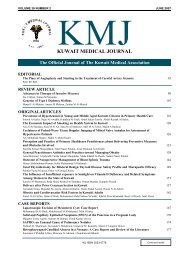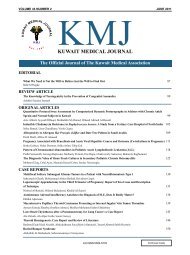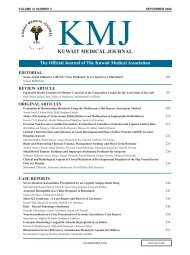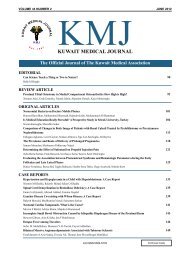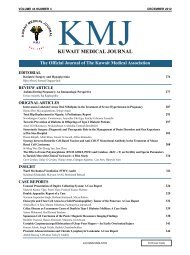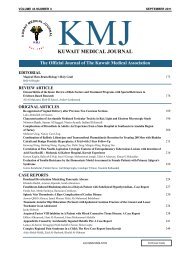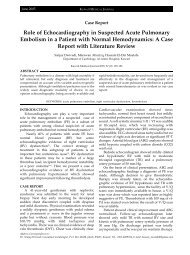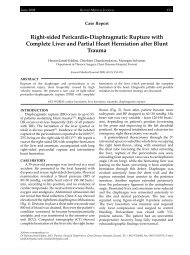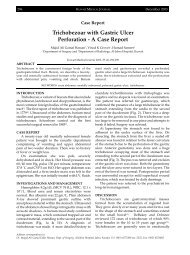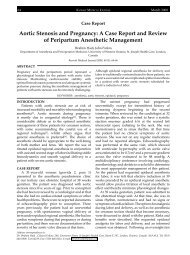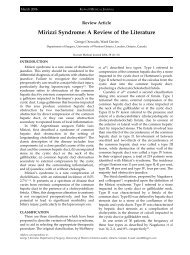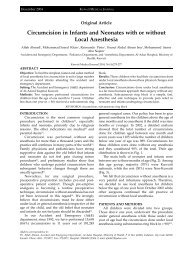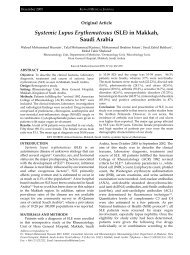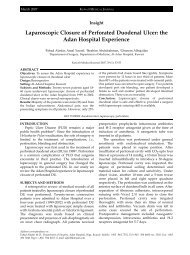June 09-41-2.indd - Kma.org.kw
June 09-41-2.indd - Kma.org.kw
June 09-41-2.indd - Kma.org.kw
You also want an ePaper? Increase the reach of your titles
YUMPU automatically turns print PDFs into web optimized ePapers that Google loves.
94The Immune System in Pregnancy: Friend or Foe?<strong>June</strong> 20<strong>09</strong>suggest that there is a downregulation ofTh1-type immunity and upregulation of Th2-type immunity during pregnancy [2] . Th1-typeimmunity is primarily mediated by Th1 cells andTh2-type immunity is induced by Th2 cells. Th1and Th2 cells are the two major subsets of CD4 +T helper cells; these two subsets have differentpatterns of cytokine production and differentroles in immune responses. Each subset inducesimmune responses that are effective at handlingcertain types of pathogens, but can be ineffective,or even pathological if made in response to othertypes of pathogens [3,4] . Th1 cells secrete the proinflammatorycytokinesinterferon-γ(IFN-γ), tumornecrosis factor-β (TNFβ), interleukin (IL)-2 andTNFα; these Th1 cytokines activate macrophagesand cell-mediated reactions important in resistanceto infection with intracellular pathogens, andin cytotoxic and delayed-type hypersensitivity(DTH) reactions. Th2 cells secrete IL-4, IL-5, IL-6,IL-10 and IL-13; these Th2-type cytokines inducestrong antibody production and are thereforecommonly found in association with strongantibody responses that are important in combatinginfections with extracellular <strong>org</strong>anisms. Whichtype of reactivity, Th1 or Th2, is activated first mayinfluence the subsequent outcome; if a particularT cell subset is activated first or preferentially ina response, it can suppress the development ofthe other subset. The overall effect is that certainresponses are dominated by either humoral (Th2)or cell-mediated (Th1) immunity [3,4] . Furthermore,Th1 cytokines such as IL-2, TNF-α and IFN-γgenerally tend to provoke inflammatory cellularimmune reactions and are thus also referred to aspro-inflammatory cytokines, while Th2 cytokinessuch as IL-10, IL-13 and IL-4 are consideredanti-inflammatory cytokines as they tend todownregulate inflammatory reactions.What is the Th1/Th2 status during normalpregnancy? Pregnancy seems to bring about ashift towards Th2 bias. Th2 cytokines have beendetected in post-partum human placental tissue [5] ,amniotic fluid [6] , endometrium and decidua ofearly pregnancy [7] , and in supernatants fromcultures of endometrial cells, decidual stroma [7] ,cytotrophoblast [5] and amnion epithelial cells.Piccinni et al [8] demonstrated significantlyhigher levels of IL-4- and IL-10-producing T cellclones from the decidua of women with normalpregnancy than from women with unexplainedrecurrent spontaneous miscarriage (RSM). SomeTh2 cytokines have been shown to be expressedin the human placenta; IL-10 is synthesized by thedecidua, chorion and amnion cells of the placenta [9] ,IL-4 is expressed by the decidua, amniochorionicmembranes, cytotrophoblast and both maternaland fetal endothelial cells [10] .IL-13, an anti-inflammatory Th2 cytokine hasthe capacity to limit inflammatory reactions thatmay arise locally at the site of implantation andwithin the placenta during pregnancy. Dealtryet al [11] demonstrated the expression of IL-13 byhuman trophoblast cells and suggested that IL-13 may play important roles in this dialogue thataids in the establishment and maintenance of theplacenta. There are reports of significantly higherIL-10 production by mitogen-activated PBMC inpregnant women as compared with non-pregnantwomen [12] . Using a sensitive on-line quantitativeRT-PCR Kruse et al [13] reported significantly reducedexpression of Th1 cytokine mRNA during normalhuman pregnancy. Th1/Th2 ratios revealed ashift to a pronounced Th2 status. Significantlyincreased IL-4-producing CD4 + and CD8 + T cellswere demonstrated in normal pregnant womenas compared to non-pregnant women. In contrast,Th1 cytokine-producing T cells were significantlyreduced in pregnancy, which is suggestive of a Th2shift in pregnancy [14] . Th2-type cytokine productionreportedly predominates in the second and thirdtrimesters of pregnancy [15,16] leading to a hypothesisthat successful pregnancy is correlated with andperhaps depends on the preferential stimulation ofTh2 cytokine-producing T cells.Besides an anti-inflammatory effects mediatedby Th2 cytokines, several other non-Th2 cytokineshave positive influences on the conceptus;cytokines such as IL-3, granulocyte-macrophagecolony-stimulating factor (GM-CSF) and colonystimulatingfactor-1 (CSF-1) have been shown to actas growth factors for the placenta [2] .Thus, we can view normal, successful pregnancyas a situation in which the maternal immune systemacts in a “friendly” manner, either not generatingstrong rejection reactions or keeping such reactionsunder check. We can view this as a sort of a“friendly”, protective role of the immune system innurturing the conceptus and ensuring the successof pregnancy.Maintenance of a Protective Th2 Status duringPregnancyIf pregnancy brings about a protective Th2-bias,how is this bias maintained? Cytokines, hormonesand other molecules appear to play critical roles indirecting the immune reactivity towards a Th2 biasand then maintaining it that way. The Th2-inducingeffect of IL-4 predominates over other cytokines,so that if IL-4 levels reach a given threshold,differentiation of Th cells into the Th2 phenotypeoccurs.



